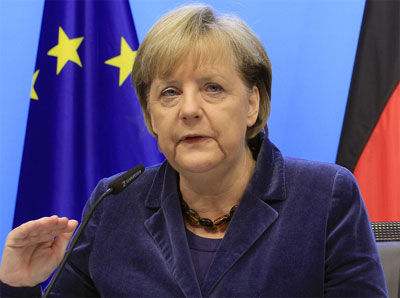Suddenly, however, there is an American president who, though he said last week that he would “strongly support NATO”, has also called the alliance “obsolete” and suggested that his support might be conditional on allies meeting their commitments to spend more on defence.
然而,即使美國總統上周表示他強烈支持北約,但是現在他卻認為北約聯盟已經過時,并且表示只有同盟國加大對國防的投入,他才會繼續支持北約。
By the ghastly logic of mutual assured destruction (MAD) , deterrence must be unconditional to be credible.
于共同毀滅原則的可怕邏輯,所以核威脅毫無疑問會成功。

Countries in eastern and central Europe are beginning to fret about their vulnerability to nuclear blackmail by Russia under Vladimir Putin.
由歐洲中東部的一些國家開始惶恐因為在普京的領導下,俄羅斯的核力量對歐洲國家造成了威脅。
Germany's most obvious response would be to approach France and Britain, NATO's other two nuclear powers, for a shared deterrent.
因為法國和英國是擁有核武器的北約國家,德國為了與其共享核威懾,于是就開始親近法國和英國。
But their arsenals are small.
但是他們的軍火庫規模很小。
France, moreover, has so far been unwilling to cede any sovereignty over its nuclear arms and has always been sceptical about shared deterrence.
更何況法國至今不愿意放棄核武器的主權,并且一直對共享核威懾持懷疑態度。
Britain, as its prime minister, Theresa May, has already hinted, might make its nuclear shield a subject of negotiation during the upcoming Brexit talks.
英國首相Theresa May暗示,打算利用防御核武器的能力作為即將到來脫歐談判的重要籌碼。
To Maximilian Terhalle, a German professor currently teaching in Britain, this means that Germany, Poland or the Baltic countries could never fully rely on France or Britain retaliating against Russia for a strike against them.
目前在英國教書的德國教授Maximilian Terhalle認為德國、波蘭和其他波羅的海的國家絕不能完全依賴通過與英法共享核威懾來報復打擊俄羅斯。
He concludes that Germany must think about getting its own nukes, perhaps in collaboration with neighbours.
他總結表示,德國應該考慮擁有自己的核彈,或許可以與鄰國合作制造核彈。
Even the leader of Poland's governing party, Jaroslaw Kaczynski, a habitual Germanophobe, called in February for a European nuclear deterrent, presumably financed largely by Germany.
一向討厭德國人的波蘭執政黨領導人Jaroslaw Kaczynski在二月要求要有歐洲的核威懾,德國可能會在資金上大力支持。
The different dangers posed by Mr Putin and Mr Trump have raised the question of “how to deter whom with what”, even though German nukes are not the best answer, says Karl-Heinz Kamp of the Federal Academy for Security Policy, a government think-tank.
政府智囊團的聯邦安全政策學院的Karl-Heinz Kamp表示,由普京造成的不同威脅,以及特朗普提出的 “如何震懾,震懾誰,又靠什么來震懾” 的問題,即使德國擁有了核彈并非最佳的解決方案。
Mr Terhalle, for his part, thinks that even a debate about a German nuclear weapon could help—if it convinced Mr Trump to stop undermining the existing international order.
Terhalle先生本人認為,即使是德國隊擁有核武器的一些風聲就能夠起到幫助作用,可能會迫使特朗普停止破壞已有的國際秩序。












